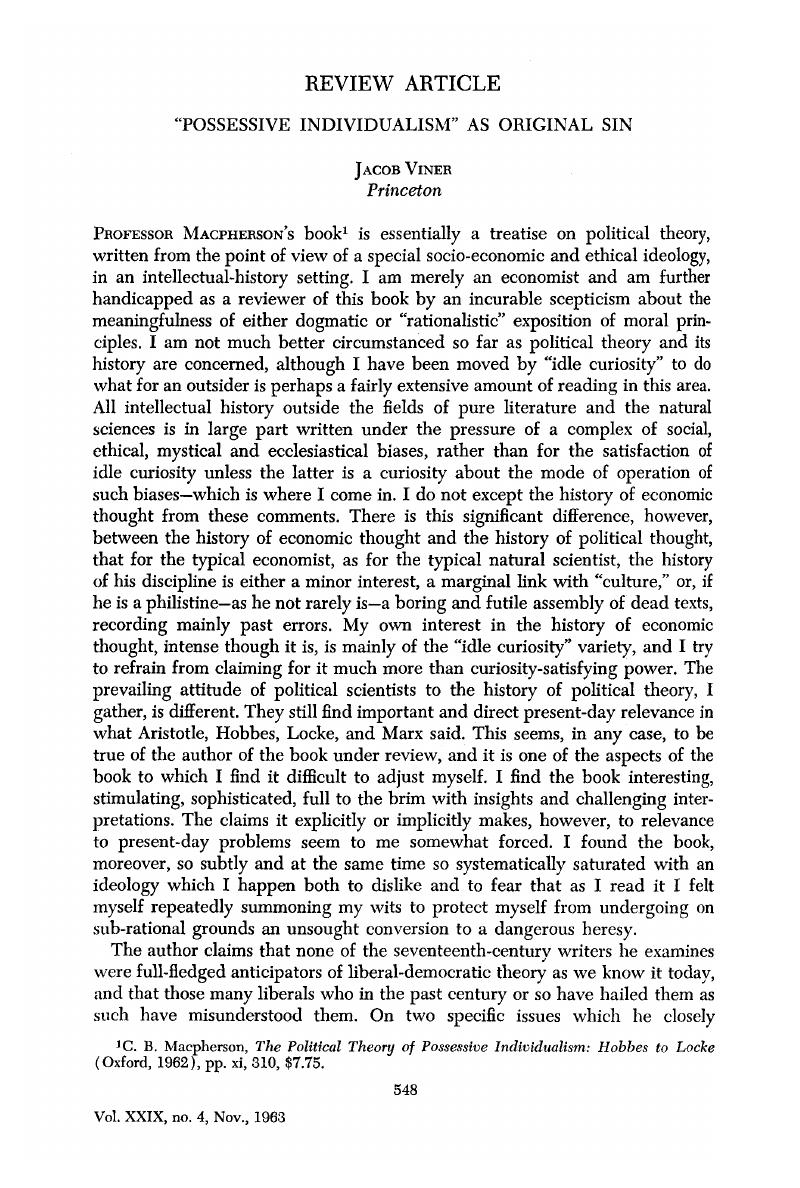Published online by Cambridge University Press: 07 November 2014

1 Macpherson, C. B., The Political Theory of Possessive Individualism: Hobbes to Locke (Oxford, 1962), pp. xi, 310, $7.75.Google Scholar
2 Marx, K. and Engels, F., The German Ideology [written in 1846], Pascal, R. ed. (London, 1938), 22, 24.Google Scholar
3 This seems to be essentially the same theory as that expounded by Feuer, L. S., in “Ethical Theories and Historical Materialism,” Science and Society, VI (1942), 242–72Google Scholar, where it is argued, I presume seriously, that in a socialist world, because “inner strife” and “latent hostility” would be absent, there would be no need for “ethics.”
4 The term “moral demonstration” to mean essentially effective and rational persuasion short of logical demonstration is Joseph Glanvil's. See Cope, Jackson I., Joseph Glanvil Anglican Apologist, Washington University Studies (St. Louis, 1956), 61.Google Scholar Plato seems to me to be expounding the same idea when he reports Socrates as asking: “Shall we, then, assume two kinds of persuasion, the one producing belief without certainty, the other knowledge?” and Gorgias replying: “Yes, of course.” Plato, , Gorgias, Helmbold, W. C., tr., (New York, 1952), 13.Google Scholar
5 Philosophical Rudiments, The English Works (London, 1841), II, 127.Google Scholar
6 Leviathan (Everyman, ed.), Part 1, chap. 13, 64.Google Scholar
7 Human Nature, The English Works, IV, 48.Google Scholar
8 Philosophical Rudiments, The English Works, II, Epistle Dedicatory, iv.Google Scholar
9 Leviathan (Everyman ed.), chap. 30, 182. It is characteristic of Hobbes that he omits “liberty” from the traditional list; it is also characteristic of him that he adds “conjugall affection,” for to Hobbes it was the family, not the individual, that was the social unit or cell.
10 Behemoth, The English Works, VI, 361.Google Scholar
11 Cited from Baxter, Richard, A Holy Commonwealth (1659), 69 Google Scholar, by Gough, John W., Fundamental Law in English Constitutional History (Oxford, 1955), 134.Google Scholar
12 I hesitate to introduce into the argument a further semantic complication. Locke in this passage uses the plural term “properties.” I have noticed his use of it on other occasions, but I have not noticed whether its context did or did not imply that it was being used in the broad meaning. The properties may be merely the equivalent of “estates.” On the other hand, they may be “life, liberty, and estate.” Except for §94, however, I have not noticed any use of the plural term “proprieties” in a “crucial” passage.
13 Locke claimed “inalienability” only for the right to freedom of conscience in religious matters. Most of the modern critics characterize Locke as an exponent of laissez-faire, but to his credit Macpherson rejects this interpretation. It is only with respect to religion that Locke is a non-interventionist. In most respects, he is a routine, moderate mercantilist.
14 On the history of usage with respect to the term “consent,” see for Roman law usage, de Piermont, F. H. Strube, Ebauche des Loix Naturelles et du Droit Primitif (new ed., Amsterdam, 1744), 145.Google Scholar For medieval usage, see Clarke, Maude Violet, Medieval Representation and Consent (London, 1936).Google Scholar For one English example, from the unlimited number readily available, cf. Smith, T., The Commonwealth of England [written 1565] (London, 1583)Google Scholar, bk. II, chap, II: “… the Parliament of England, which representeth and hath the power of the whole realm, both the head and body. For every Englishman is intended to be there present either in person or by procuration and attorney, of what preeminence, state, dignity, or quality soever he be, from the prince … to the lowest person of England. And the consent of the Parliament is taken to be every man's consent.”
15 Philosophical Rudiments, chap, XII, 7, English Works, II, 157–8.Google Scholar Italics mine. Locke claimed “absolute dominion” for the individual only over his religious conscience. What he was contesting, with respect to other personal rights, was “absolute dominion” by government, and especially by an absolute monarch.